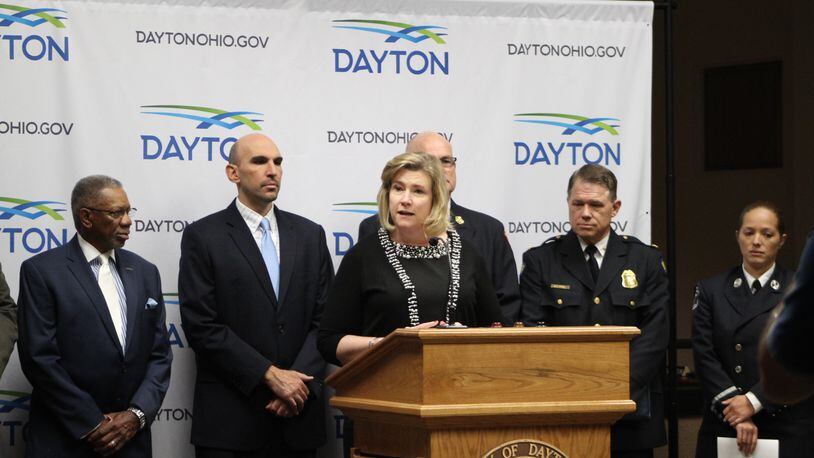“Companies that have obligations to protect the public weren’t doing that,” Lebanon City Attorney Mark Yurick said last week. “As a result, cities and their taxpayers have incurred substantial costs.”
MORE: Dayton sues drug makers for role in overdose epidemic
On Tuesday, the Lebanon City Council is expected to vote on whether to hire Columbus lawyer David J. Butler to handle its lawsuit.
The litigation is designed to correct problems caused by addiction to opioids, a class of prescription painkillers and illegal drugs such as heroin, and to compensate for the costs to local governments.
“The litigation focuses on the manufacturers and wholesale distributors and their role in the diversion of millions of prescription opiates into the illicit market which has resulted in opioid addiction, abuse morbidity and mortality. There is no easy solution. Many of the facts of the case are locked behind closed doors. The billion dollar industry denies liability,” according to the “authority to represent” agreement to be considered by the Lebanon council.
Several companies named in Dayton’s lawsuit said at the time the suit was announced they are concerned about improper use of opiate medications and denied wrongdoing or acting irresponsibly.
According to the proposed agreement, Butler would get 30 percent of any award in the local lawsuit, plus expenses.
“The damages to abate the public nuisance could be very substantial,” Yurick said.
The litigation is separate from a lawsuit filed in May by Ohio Attorney General Mike DeWine against five drug makers.
MORE: Ohio AG sues drug makers
DeWine’s suit alleges that the companies spent millions of dollars to deceptively market their drugs to doctors and patients in Ohio, leading to the addiction crisis that is “a human tragedy of epic proportion.”
MORE: Ohio AG going after drug makers
The suit, part of a broader strategy DeWine is pursuing, claims the companies violated Ohio’s Consumer Sales Practices Act, committed Medicaid fraud, created a public nuisance and violated the Ohio Corrupt Practices Act. It seeks an injunction, damages for the state and repayment for consumers.
Butler and the Taft Stettinius & Hollister firm already represent Portsmouth and Cincinnati, as well as Adams, Brown, Scioto, Campaign and Darke counties, Yurick said.
“The retention of Counsel is necessary and desirable given the expertise required to prosecute this complex case against the manufacturers and wholesale distributors,” according to the resolution the Lebanon council is to consider on Tuesday.
MORE: Kettering, county surpass 2016 fatal overdose total before June
A federal lawsuit filed by Dayton was among 14 in Ohio’s South District on a list attached to Polster’s appointment in December.
MORE: Montgomery County has been national example of overdose crisis
Yurick, who was a partner in the Taft firm before joining the Lebanon city government full-time, said he picked the Taft plan from various offers made by law firms.
“I received other solicitations as well,” he said.
Firms from West Virginia, Florida, Mississippi and Texas are also listed in an agreement setting the terms for Taft’s representation of Lebanon in the multi-district litigation.
Lebanon Councilwoman Wendy Monroe said she was “alone on council” opposed to hiring Butler to handle the lawsuit, since lawyers gave the council their “sales pitch” in a recent executive session.
“The attorneys have a lot to gain,” Monroe said.
MORE: Heroin’s impact: Special Report of the Dayton Daily News
In Warren County, Monroe said, deadly overdoses were traced to heroin and other illegal drugs, rather than prescription drugs made or distributed by the companies being sued.
“The money is nominal and it’s not going to fix the problem,” she said. “We’re just looking for somebody to blame.”
Monroe, who also said, “the opioid epidemic is horrible,” was the only one to make her position known at last Tuesday’s Lebanon City Council work session.
Mayor Amy Brewer and Councilwoman Krista Wyatt offered to sponsor the legislation that would hire Butler and the Taft firm. Brewer also expressed gratitude to the lawyers who made the presentation in an executive session.
Councilman Jim Dearie said he planned to consult with Warren County Prosecutor David Fornshell.
Fornshell said his office has no role in the city’s decision.
“This is a decision that individual cities, counties, and states are making. We are legal counsel to the commissioners, but ultimately, it’s the commissioners’ decision just like it is Lebanon City Council’s decision,” Fornshell said in an email. “Those who have approached me about this are just interested in my opinion given that I work in this field, or plaintiff’s attorneys thinking that it is my decision for the county, which it is not.”
Multi-district litigation is similar to a class action, in that there are numerous defendants, but different enough to be judged separately, Yurick said.
Typically settlements are reached after a few of the cases are tried, he added.
Yurick said the damages would be calculated by economists hired to figure the damages to individual local governments.
“Those costs are likely to continue,” Yurick said, while declining to comment on the executive session discussion preceding Tuesday’s work session.
About the Author
